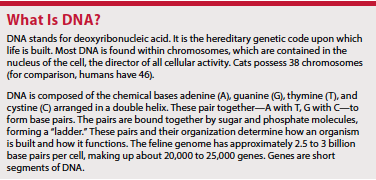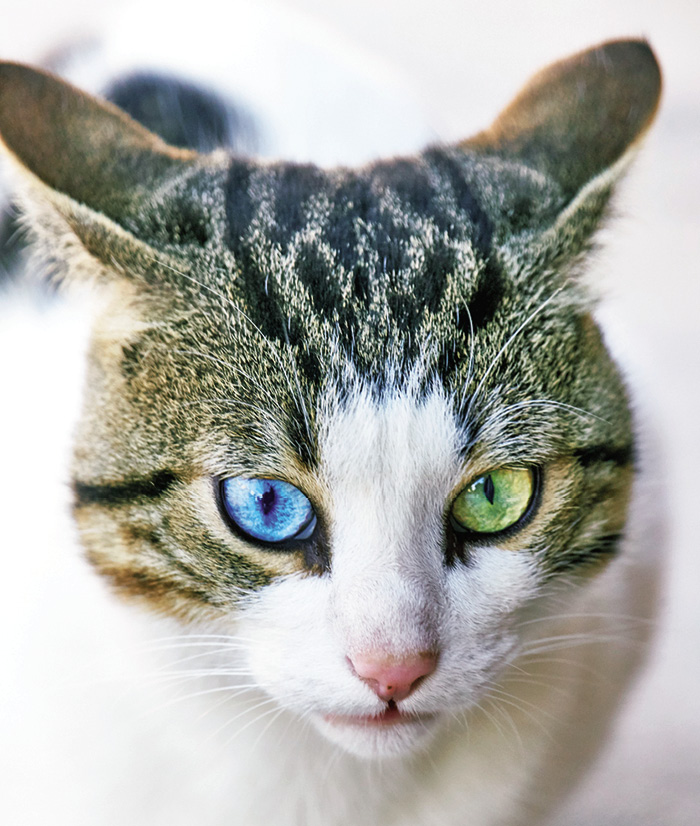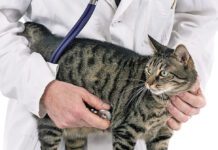The internet is abuzz with people doing breed identification for their mixed breed dogs, something like canine DNA genealogy. While DNA testing for cats is somewhat slower to become trendy, it is available. Is it worth doing for your cat?
For curiosity, you might want to know what breeds or groups of feline ancestors are behind your cat. Some behavior traits are associated with certain breeds, so knowing your cat has Siamese behind her might explain her tendency to suck on wool items like your scarf.
Finding color traits can be interesting but, unless you are a breeder, it’s not relevant. Afterall, you can see what your cat looks like.
The real plus for cat owners is the chance to learn about genetic predispositions for health problems. Even mixed breed cats have genetic tendencies. You can also get your cat’s blood type, which may be important if she ever needs a transfusion post trauma or post-surgery.
But the most valuable information may well be screening for genetically mediated diseases. Not all the tests identify specific genes that directly cause disease. Many of them identify markers, which means the risk is estimated. Developing the health problem may be influenced by other genes as well as environmental factors. That said, it can be very helpful to know your cat has a predisposition to polycystic kidney disease or tooth resorption.
Being aware of a predisposition can help you to adjust your cat’s care to minimize that risk. For example, if your cat shows a predisposition for dental problems, stay on top of her oral health. Your veterinarian can tell you your cat’s dental status at that moment, but the testing might give you the impetus to stay ahead of any problems.
With polycystic kidney disease, you can begin to encourage your cat to drink more, add some liquid to her food, and use canned food to help ensure proper hydration, which is important for kidney function. With a kidney disease predisposition, it might be worthwhile to include bloodwork for kidney disease in her annual physical appointments.
Obviously, you want to share your cat’s results with your vet. Some of the testing companies automatically forward a copy of your cat’s results to your veterinarian. Some include a consultation with one of their veterinary geneticists as part of the cost.
How do you get a genetic screen for your cat? That’s easy. Most companies provide a sterile kit with swabs to collect cells from the inside of your cat’s cheek. It is important to do this when your cat has a “clean” mouth, so not right after she has eaten.
Results are generally return in a couple of weeks. Costs tend to range around $100, although some companies offer periodic specials or group discounts if you plan to test multiple cats.
 Bottom line: Is it worth doing DNA testing on your cat? If you are a breeder, absolutely. You can avoid doubling up on any genetic predispositions for feline health problems.
Bottom line: Is it worth doing DNA testing on your cat? If you are a breeder, absolutely. You can avoid doubling up on any genetic predispositions for feline health problems.
For your spayed/neutered pet cat? Maybe. Knowing your cat has an “all clear” on many genetic predispositions can give you peace of mind.
It is important to recognize that many health problems have multiple causes, however. Being genetically free of polycystic kidney disease does not mean your cat will never develop some form of renal disease. And no matter what the dental health results are, your cat will always benefit from regular, appropriate dental care.

Some companies are associated with research programs, so your cat’s DNA may be used to help future cats. Don’t scrimp on your cat’s regular health care to do it, but checking the DNA results could be useful if you can fit it in the budget. It is a one-time expense.




